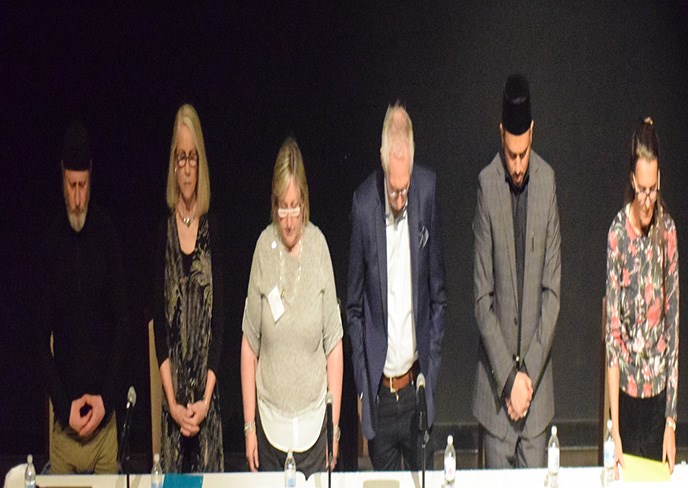People of multiple faiths gathered for the 11th annual World Religions Conference at the Cochrane RancheHouse on April 10 to discuss a common theme in their beliefs.
More than 100 people filled the auditorium to hear the panel talk on the theme of compassion.
Representatives from Judaism, Christianity, Atheism, Baha’i faith, and Islam discussed the idea at length.
The event was emceed by Robyn MacKay who opened the discussion by sharing stories of compassion from her world travel including a time at Umayyad Mosque in Damascus, where a group of Iranian women provided her with a chador, a traditional outer garment worn by women in Iran and Iraq.
“They created a harmony of inclusion, bridging any religious or cultural differences we had,” said MacKay.
“They personify the core human value we are talking about tonight.”
After MacKay’s opening speech, each speaker was given 15 minutes to present the views of their ideology in regards to compassion.
David Lertzman, assistant professor of Environmental Management and Sustainable Development at the University of Calgary, represented Judaism and was the first to speak.
“In the Jewish culture, compassion is seen as [being] among the highest of virtues,” said Lertzman.
“It’s a commandment that we are required to fulfill but it’s fulfilled through a number of legal actions and duties that you’re required to do.”
Lertzman went on to define one of these laws of compassion which requires that orchard growers prune and care for the furthest trees in their orchard but never pick them in order to save the fruits for travellers and animals.
He ended his segment with the singing of a traditional healing prayer accompanied by guitar.
The next to speak was Leslie Davies, Principal of St. Margaret School in Calgary, who represented Christianity.
She spoke of compassion as shared suffering.
“Compassion is not simply to feel pity for the plight of another. Its Latin roots mean ‘to suffer with’,” said Davies.
“Compassion combines recognition of the suffering of others with a desire to act and, through that action, to lessen someone else’s suffering.
Davies designated Jesus Christ as being the model of compassion for the Christian faith.
The third to speak was Canadian playwright Caroline Russell-King who represented the Atheist community.
She affirmed that atheistic people can have moral values without following a religion.
“Atheists understand morality and ethics are independent constructs from religion,” said Russell-King.
“I get [morals and ethics] from mostly the same places you do: books, literature, television, theatre, life. I get it from my family, my friends, my peers.”
Michael Bopp, co-founder of the Four Worlds Center for Development Learning, spoke on behalf of the Baha’i faith.
He spoke of compassion as the antithesis to “us and them” ideology.
“In the teachings of all the religions, including the teachings of Baha’I, there is no ‘them’. There is only ‘us’,” said Bopp.
If you’re seeing our community or our people [as] greater than or better than [others], that’s not religion. That’s counterfeit.”
The final speaker was Imam Zahid Aabid representing Islam.
He referred to chapter four, verse 37 of the Quran to define compassion.
“In this verse of the Holy Quran, God Almighty is talking about [showing] kindness, being compassionate, to not only your parents, the neighbours, but also the strangers,” said Aabid.
“This is a core duty of all Muslims that they must be there to serve those who are in need.”
The speakers answered several questions written in from members of the audience and the forum conclude with a minute of silent prayer.
MacKay’s Cochrane Ice Cream was served afterwards to everyone in attendance.




